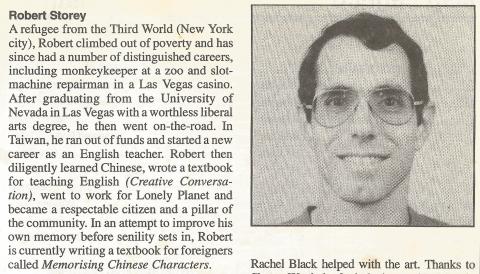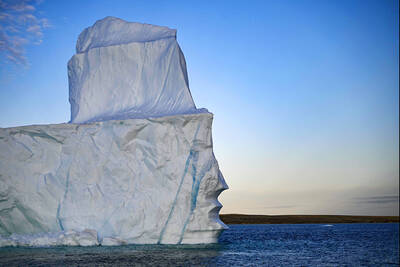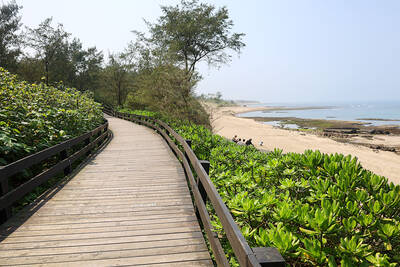Robert Storey, author of the first four editions of the Lonely Planet Taiwan guide and more than a dozen other guide books, died on Dec. 26 at his home on Taiwan’s southeast coast. He was 63 years old.
Though Storey lived a private life in the foothills outside of Taitung City, his guides were familiar to a huge number of English-speaking travelers who came through Taiwan from the late 1980s to the early 2000s, and thousands more who traveled through East Asia.
In fourteen years with Lonely Planet, Storey authored or co-authored a dozen different guides, including those for South Korea, China, Vietnam and the first ever English guide to Mongolia.

Photo: David Frazier
MAN OF MANY TALENTS
Authors of those books were allowed to pen their own biographical blurbs, and in his 1994 Lonely Planet Taiwan guide (3rd edition), Storey described his early life (see picture above).
Storey came to Taiwan in 1986 almost by accident, stuck here on a two-day layover. He quickly returned, and stayed for the next three decades until his death.
In his early years in Taiwan, he published his own guide, Taiwan On Your Own. The DIY effort caught the attention of Lonely Planet, who commissioned him to write their inaugural Taiwan guide, Taiwan — a travel survival kit, published in 1987.
At that time, Lonely Planet was fast becoming one of the world’s most popular travel guides by offering the kind of unvarnished advice you might get from a fellow budget traveler, uninvited opinions and all. Storey joined the guide’s legendary early generation of writers, and Lonely Planet founder Tony Wheeler once referred to him as “our straight-arrow writer” for his chaste habits and scrupulous attention to detail. This status only fell into question once, when, while working on a Vietnam guide, Storey’s driver was secretly soliciting bribes from hotels.
In the Taiwan guide, Storey took advantage of a Lonely Planet writer’s freedom to be sarcastic, off-the-cuff and tactlessly direct. He wrote of the Nantou County’s Aowanda Forest, “So many tour buses come up here on weekends that it’s a wonder the mountain doesn’t collapse.”
Of road rules, he scoffed, “Basically, there aren’t any. When the Taiwanese get behind the wheel of a car or on the seat of a motorcycle, they smell blood.”
To blend into local society, he advised, “The Chinese love name cards. Get some printed before or immediately after you arrive in Taiwan. Throw them around like confetti.”
Storey also cautioned visitors to beware of Taiwan’s flowery rhetoric. “One examination given to prospective employees involves taking a single meaningful sentence and rewriting it into a two-page essay with no increase in content. Many people also talk this way.”
The publication of Storey’s first Taiwan edition came the same year as the end of martial law in Taiwan and during the nation’s electronics boom. Not only did a combination of social liberalization and easy pay for English teaching jobs draw in a new, budget-conscious expatriate community, it also marked an era when Westerners began to settle down and stay. Many were drawn from Southeast Asia’s hippy trail or lured to teach in cram schools, and a huge number landed with Storey’s Lonely Planet guide in hand.
1994 EDITION — TIME CAPSULE
The 1994 edition now reads like a time capsule for that era. In the book, the acronym he used to describe Taiwan was NIE, “newly industrialized economy.” He prefaced a passage on e-mail services, saying it was intended only for “the real computer freaks,” as there were only two service providers and Internet connection time cost NT$14 per minute. The population was 21 million, per capita income around US$10,000 and there was one motorcycle for every two people. Of Taipei, he wrote, “Unless the wind is blowing, the air is toxic.” And in that pre-MRT era, it was.
When I first arrived in Taipei in 1995, I was reading Storey’s 1994 Taiwan guide on the plane. But it was only 15 years later that I realized that the geeky face in the front of my guidebook was actually attached to a real person. I bumped into Storey by total happenstance in Kasa, a sleepy Taitung cafe. Though his name was known to most Taiwan expats, only a couple of my Taitung-based friends had ever met him. I mainly remember Robert for his dry, intelligent sense of humor. We met again over the years and traded e-mails and books.
Of all of the guidebooks Storey worked on, he held on to his authorship of the Taiwan guide tenaciously. Early generation Lonely Planet authors owned their guides’ copyrights, and Storey refused to relinquish his Taiwan guide copyright. Lonely Planet could only proceed by rewriting the guide from start to finish, which they did with the help of three writers for the fifth edition in 2001.
Storey spent nearly all of his 30 years in Taiwan in Taitung, and the descriptions in his 1994 guide hint at his reasons. “Taitung is likely to remain a quiet backwater for a long time” and is “blissfully free of the traffic jams, noise and pollution which characterize Taiwan’s big cities.”
“On the east coast it’s easy to forget where you are. The sparsely inhabited rugged landscape could pass for the coast of New Zealand.”
His Taitung chapter in that book was just six and a half pages, and many of his friends believed this brevity was a smokescreen, a way of keeping Taitung a secret.
Storey suffered for years from Crohn’s disease, an often debilitating and painful ailment of the intestinal tract. The disease kept him from drinking alcohol, but otherwise he did not reveal his suffering publicly.
After Storey stopped writing for the Lonely Planet in 2001, he devoted himself to a new passion, the open-source Linux operating system, which he wrote about on a site called Distrowatch. He also consulted for Taiwan’s Ministry of Culture and three years ago opened a guest house in Taitung city.
Storey relinquished his US citizenship late last year to become a citizen of Taiwan, an event which his friend say gave him much satisfaction.
Friends knew him as humorous, knowledgeable and a person to go to for advice on difficult questions. He is survived by his wife and remembered fondly by the small group of friends who knew him.

A few weeks ago I found myself at a Family Mart talking with the morning shift worker there, who has become my coffee guy. Both of us were in a funk over the “unseasonable” warm weather, a state of mind known as “solastalgia” — distress produced by environmental change. In fact, the weather was not that out of the ordinary in boiling Central Taiwan, and likely cooler than the temperatures we will experience in the near-future. According to the Taiwan Adaptation Platform, between 1957 and 2006, summer lengthened by 27.8 days, while winter shrunk by 29.7 days. Winter is not

A sultry sea mist blankets New Taipei City as I pedal from Tamsui District (淡水) up the coast. This might not be ideal beach weather but it’s fine weather for riding –– the cloud cover sheltering arms and legs from the scourge of the subtropical sun. The dedicated bikeway that connects downtown Taipei with the west coast of New Taipei City ends just past Fisherman’s Wharf (漁人碼頭) so I’m not the only cyclist jostling for space among the SUVs and scooters on National Highway No. 2. Many Lycra-clad enthusiasts are racing north on stealthy Giants and Meridas, rounding “the crown coast”

March 25 to March 31 A 56-year-old Wu Li Yu-ke (吳李玉哥) was straightening out her artist son’s piles of drawings when she inadvertently flipped one over, revealing the blank backside of the paper. Absent-mindedly, she picked up a pencil and recalled how she used to sketch embroidery designs for her clothing business. Without clients and budget or labor constraints to worry about, Wu Li drew freely whatever image came to her mind. With much more free time now that her son had found a job, she found herself missing her home village in China, where she

In recent years, Slovakia has been seen as a highly democratic and Western-oriented Central European country. This image was reinforced by the election of the country’s first female president in 2019, efforts to provide extensive assistance to Ukraine and the strengthening of relations with Taiwan, all of which strengthened Slovakia’s position within the European Union. However, the latest developments in the country suggest that the situation is changing rapidly. As such, the presidential elections to be held on March 23 will be an indicator of whether Slovakia remains in the Western sphere of influence or moves eastward, notably towards Russia and